
I must begin by declaring my interest. Bernardine Bishop, who died last year, was a friend from college days, and I was delighted by the success of her novel Unexpected Lessons in Love, which happily she lived to enjoy. The second work of her late flowering period, Hidden Knowledge, published nearly a year after her death, is as remarkable and surprising as its predecessor. During her final illness she circulated her work-in-progress to friends and family, so I had a preview, and can even remember discussions about choice of title. Rereading the novel in its finished form, I find it even better than I remembered.
Unexpected Lessons dealt boldly with bowel cancer, a taboo topic all too close to her, and in Hidden Knowledge she mines, though less directly, her years of experience as a therapist. Its theme is the dark area within us, "the things people do not know about themselves, the things they cannot face". It tells the story of an intersecting group of friends and strangers, living in London and brought together by events. At the centre of these is the imminent trial of Father Roger Tree, a recently defrocked priest who has been accused of sexual abuse and is on bail, taking refuge with his sister Romola. Their older brother, Hereward, a successful novelist, is meanwhile in hospital, in a coma, having suffered a massive cerebrovascular accident during heart surgery. These three middle-aged childless siblings, a family in crisis, are part of an intricate network that spreads outward into other lives, with connections, some of which remain hidden, except to the reader.
The subtlety and insight with which Bishop explores paedophilia and clerical abuse are exemplary. Through her moral balance and literary expertise, an untouchable subject becomes comprehensible, at times even funny: the correspondence between Father Rog and his beleaguered friend Bishop Pip outdoes Muriel Spark and Evelyn Waugh in high Catholic comedy, yet has no touch of malice or frivolity. She presents us with ordinary people, faulty, in their own eyes sinning, living their lives as best they can, sometimes failing, sometimes moving onwards. The plot is brilliantly articulated: storylines present themselves to her with effortless and enviable ease, and her minor characters are a delight. The ageing novelist has a beautiful Italian fiancee, Carina from Genoa, many decades his junior, to whom he has left his house and a great deal of money but, although she is keen on going shopping and spends much time painting her nails by his unresponsive bedside, she is no gold-digger and does not want him to die. The young man who shops Father Rog, as he thinks with the good will of his therapist, is neither villain nor victim, and is happily gay despite his early sexual experiences; a nice chap who means no ill.
Good intentions go wrong: therapists and priests may make mistakes; siblings never get over their childhood rivalries; some abuse can never be undone, some grief never forgotten. Bishop is well acquainted with the shadowy emotions of shame and envy, and she embodies them in a modern morality play that embraces the technicalities and ethics of artificial insemination, the enigma of the life-support machine, the niceties of emailing to and from prison, and theeating habits of the clergy.
There is one shocking dilemma, one very dark secret, at the heart of the novel. It would spoil the plot to describe it in detail, but for the reader, even the second-time-round reader, it remains insoluble to the very end. It tries human wisdom to the utmost: to tell, or not to tell, when the consequence of telling will prove painful and terrible? Bishop had long been fascinated by the concept of the "impossible moral conundrum", the day of reckoning, and here she has created one that keeps us in suspense to the last moment. She resolves it with a tragic humanity and wit.

